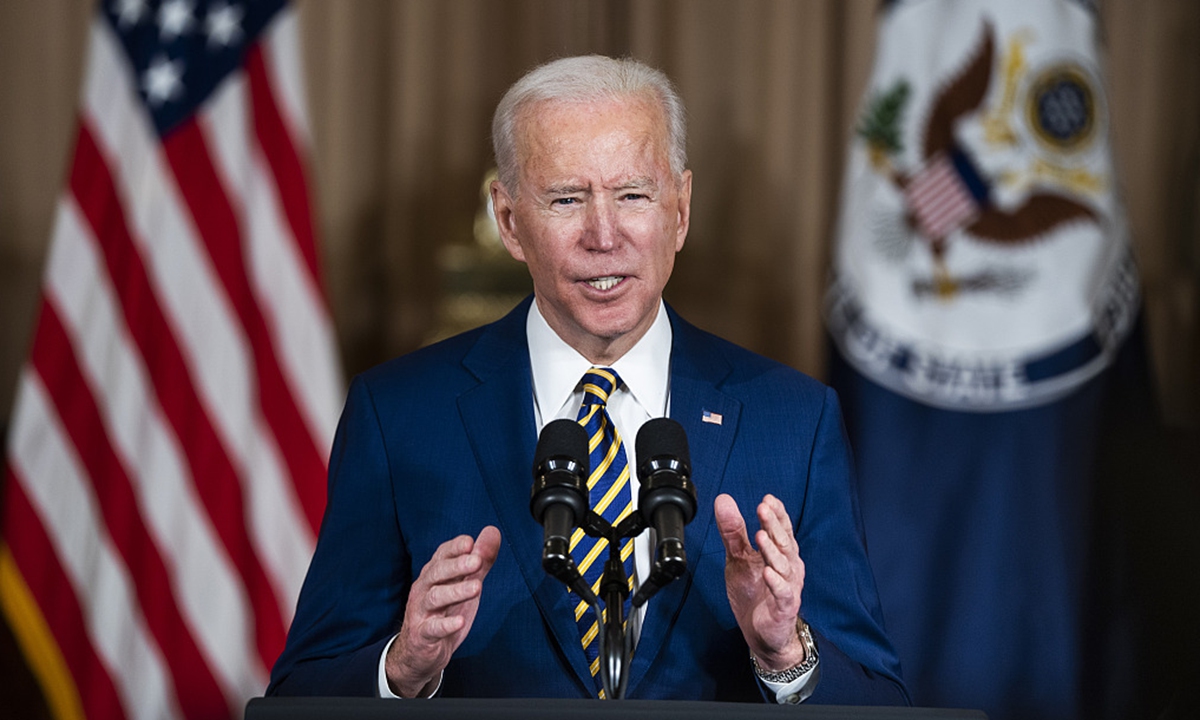
US President Joe Biden. Photo: VCG
Picture such an America: With economic growth decelerating and unemployment rate rising, the Democratic president launched stimulus plans after taking office, hoping to use large-scale government spending to get the US economy out of its quagmire and recover "past glory." People may think of the US in 1933, when then president Franklin Roosevelt's New Deal revitalized the US economy. People may also think of the US today: As the US is experiencing slow recovery from its worst recession in decades, US President Joe Biden on Monday signed a $1.2 trillion bipartisan infrastructure bill into law.But there are doubts if the US can get out of the woods with a "new deal" again. Roosevelt's New Deal led to a rapid increase in US national strength and laid the foundation for the US to become a superpower. American people inevitably yearn for this glorious past. But today, can the US overcome political extremes and fragmentation and rebuild the country?
Indeed, both Biden's bill and the New Deal embody the idea of strengthening government intervention to promote economic recovery. Similar to the three goals of the New Deal - relief, recovery and reform - Biden's bill aims at fixing crumbling infrastructure and creating new jobs. This will bring some positive factors to the US economy and society.
However, unlike the Roosevelt era, the Biden administration is facing more complicated challenges in implementing the bill. First, due to the differences within the Democratic Party and the Republican Party's obstruction, the final package falls short of the president's previous ambitions. This has brought certain limitations to the bill's implementation. The $1.2 trillion bill contains $550 billion in new funds to be used for electricity grids, rail, broadband, climate resiliency and many other areas, and the funding will be spread over a five-year period.
"Frankly, this is not a large amount and may not have a fundamental impact on the improvement of US infrastructure. The bill may eventually turn into a game of dividing money into different areas, instead of forming a promising big project like the New Deal," Lü Xiang, a research fellow at the Chinese Academy of Social Sciences, told the Global Times.
In addition to the obstacles brought by partisan competition, the bill also has to face problems such as political corruption in the US. "Who is closer to the government? Who is more active in donations? And who plays a greater role in the elections? Such questions may eventually turn government investment into 'pork barrel' funds," Lü said.
Low administrative efficiency and high costs have also been the knotty problem in US infrastructure construction. Take the "Big Dig," a megaproject in Boston constructed from 1991 to 2007. The project was to reroute the chief highway through the heart of the city into a 1.5-mile tunnel - yet it took 16 years and cost some $20 billion to complete it. If the US federal government's infrastructure projects affect local governments' interests, it will inevitably have an impact on the projects' construction.
Infrastructure construction is a good thing, but it seems particularly difficult to implement in the US. It is supposed to serve the public and provide convenience to the people. But when infrastructure construction becomes nothing but a bargaining chip between parties and even a tool to counter other countries, then how much can American people benefit from these political calculations?
In the face of the COVID-19 epidemic and economic difficulties, the signing of the infrastructure bill marks a step forward for the US. The Biden administration should do its best to ensure that the bill stays on the right track, instead of making it an empty slogan or a geopolitical tool. Otherwise, it will be American people's own interests that suffer.


